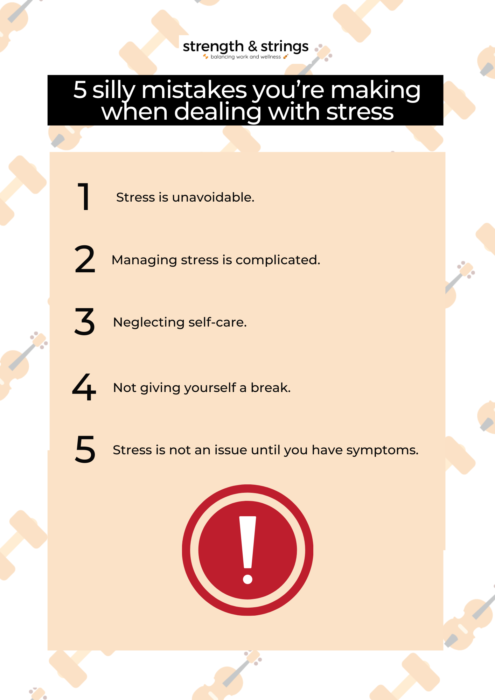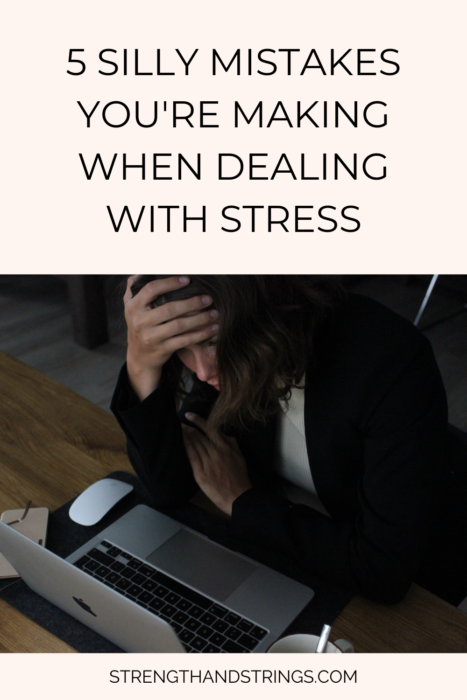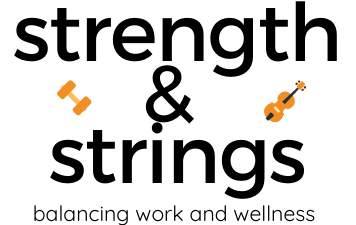
5 silly mistakes you’re making when dealing with stress
If you think about all of the times you experienced stress, you can probably recall a time where you did not manage it well and possibly made the situation worse.
Trust me, we’ve all been there.
In this post, I discuss five silly mistakes people make when dealing with stress. If you are guilty of making these mistakes- don’t worry. I also provide some guidance on how to fix or prevent them.
Mistake #1: Stress is unavoidable
At times, we are faced with stressful situations out of your control such as getting laid off from your job.
However, your perspective of a stressor can determine the level of stress you experience.
In many cases, our perception of a stressful event and our reaction can create more stress on the body than the stressor itself. This is why two people can have very different reactions to the same situation.
Going back to our opening example of being laid off, you could either accept the situation and prepare your resumé or you could panic and let it consume you.
The next time you are faced with a stressful situation, consider taking a moment to engage in mindfulness and think about how you will react to the challenge.
Mistake #2: Managing stress is complicated
Managing stress can be as simple or as complicated as you want it to be. Some people like to destress with a 10 minute walk around the block while others may prefer to go to the spa for a few hours.
This same concept can be applied to managing a stressor such as getting out of the house in the morning to get to work on time.
Instead of driving yourself crazy every day, you probably would try to streamline your routine through simple actions such as pre-planning your attire, meal prepping your lunch or packing your bag the night before.
Although taking these actions can be another thing on your to-do list, taking that time can put your mind at ease in the long run.
Mistake #3: Neglecting self-care
As I discussed in this post, self-care is the practice of taking action to preserve or improve one’s own health.
Sometimes when we are stressed out we only focus on the stressor and neglect other things, including basic needs such as eating and sleeping.
However, not meeting your body’s needs while stressed can prolong the stress response put yourself at risk for more serious side-effects such as:
- gastrointestinal issues
- weight gain
- memory impairment
- cardiovascular dysfunction
- chronic pain
Taking a moment to take care of your body during stressful times can shorten the stress response and decrease its negative effects.

Mistake #4: Not giving yourself a break
Related to my previous point, we are focused on managing our stress that we may believe that taking a break will prolong the stress.
On the contrary, giving yourself a break can interrupt your stress and reduce its symptoms.
During my experience with burnout, I refused to give myself a break from work because I felt like I did not deserve one. At the time, I was overwhelmed with virtual teaching and always had something to do.
However, I later learned that taking a few breaks would have reduced my stress and increased my productivity. After hitting rock bottom with my burnout and was forced to take a break, I felt significantly better.
If you feel overwhelmed with stress, take a moment to give yourself a break to reset.
Mistake #5: Stress is not an issue until you have symptoms
When we talk about the effects of stress, the focus tends to be on the long-term effects on the body.
Unfortunately this emphasis on the long-term effects can have people overlook the initial symptoms of stress.
Acute symptoms of stress include:
- increase in heart rate, respiration rate and blood pressure
- muscular tension particularly in back, jaw and neck
- digestive issues
- cold and clammy skin and extremities
- dry mouth and throat
- heightened senses
- change in emotional state, particularly feelings of anger, frustration and irritability
Looking at these symptoms, you may consider some of these symptoms as harmless or tolerable for a short amount of time.
If you are experiencing the acute symptoms of stress frequently, it may indicate that you are chronically stressed and need to make lifestyle changes.
Summary
These are some of the most common mistakes people make when dealing with stress.
Developing an awareness of your stress response and making adjustments as soon as possible can shorten and reduce your symptoms.
Are you making any of these silly mistakes?






